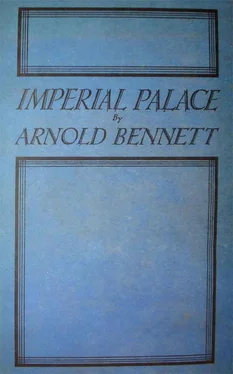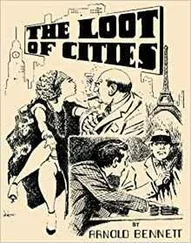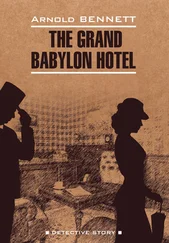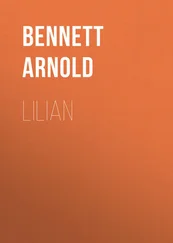Arnold Bennett - Imperial Palace
Здесь есть возможность читать онлайн «Arnold Bennett - Imperial Palace» — ознакомительный отрывок электронной книги совершенно бесплатно, а после прочтения отрывка купить полную версию. В некоторых случаях можно слушать аудио, скачать через торрент в формате fb2 и присутствует краткое содержание. Жанр: unrecognised, на английском языке. Описание произведения, (предисловие) а так же отзывы посетителей доступны на портале библиотеки ЛибКат.
- Название:Imperial Palace
- Автор:
- Жанр:
- Год:неизвестен
- ISBN:нет данных
- Рейтинг книги:4 / 5. Голосов: 1
-
Избранное:Добавить в избранное
- Отзывы:
-
Ваша оценка:
- 80
- 1
- 2
- 3
- 4
- 5
Imperial Palace: краткое содержание, описание и аннотация
Предлагаем к чтению аннотацию, описание, краткое содержание или предисловие (зависит от того, что написал сам автор книги «Imperial Palace»). Если вы не нашли необходимую информацию о книге — напишите в комментариях, мы постараемся отыскать её.
Imperial Palace — читать онлайн ознакомительный отрывок
Ниже представлен текст книги, разбитый по страницам. Система сохранения места последней прочитанной страницы, позволяет с удобством читать онлайн бесплатно книгу «Imperial Palace», без необходимости каждый раз заново искать на чём Вы остановились. Поставьте закладку, и сможете в любой момент перейти на страницу, на которой закончили чтение.
Интервал:
Закладка:
The telephone bell rang, and Miss Cass answered it.
“S O S. from Weybridge, sir,” said Miss Cass to Evelyn. “Some difficulty with the contractors over the alterations to the restaurant. The work is at a standstill. Mr. Plott would be very much obliged if you could run down there at once, instead of this afternoon. But you can’t. You are due at the Laundry at eleven. It’s after half-past ten.”
“Why can’t I?” said Evelyn instantly. “I could go to the Laundry this afternoon. Tell them I’ll be there at three—no, four. And tell Mr. Plott I’m coming to him now. And ask if my car is waiting.”
“It’s bound to be, sir. Brench is always early.”
“I’ll leave the rest to you, Cousin,” Evelyn murmured to the Hotel-manager.
In twenty seconds he was quitting the office, with gay nods and smiles, and a special smile for Mrs. O’Riordan. He was not gravely alarmed about the Wey restaurant. Nor was he flinching from problems at the Palace. Nor was his gaiety assumed. Problems were his meat and drink. He saw in the longish drive to Weybridge an opportunity for full happy reflection. He knew that he would return to the Palace with detailed solutions whose ingenuity would impress everybody. His life was of enthralling interest to him. No other kind of life could be as interesting. To-morrow, in addition to the General Meetings of the Company, there would be Sir Henry Savott to manipulate. Perhaps if he conferred with Sir Henry in the latter’s suite, as he properly might, he would encounter Gracie again. But the figure of Gracie had slipped away, like a ship standing out to sea.
Chapter X – LAUNDRY
I
The already famous Imperial Palace Hotel Laundry occupied part of a piece of freehold ground in a broad, tram-enlivened street in Kennington. The part unbuilt upon was a rather wild garden in which were many flowers. Evelyn foresaw the time when the Laundry would have to be enlarged, and the garden would cease to be. But at present the garden flourished and bloomed, and work-girls were taking their tea and bread-and-butter in it under the bright, warm September sun.
The spectacle of the garden and the lolling, lounging, tea-spilling work-girls delighted Evelyn on his arrival that afternoon, as it always delighted him. He would point out to visitors the curving flagged paths, the scientifically designed benches, the pond with authentic goldfish gliding to and fro therein, and the vine. The vine bore grapes, authentic grapes. True, they were small, hard, sour and quite uneatable, but they were grapes, growing in the open air of Kennington, within thirty feet of roaring, red trams. He was perhaps prouder of the garden as a pleasance for work-girls than of the Laundry itself. He had created the Laundry. He had not designed the buildings nor the machinery, nor laid brick on brick nor welded pipe to pipe, nor dug the Artesian wells nor paved the yards. But he had thought the whole place and its efficiency and its spirit into being—against some opposition from his Board of Directors.
It was a success. It drew over half a million gallons of water a week from the exhaustless wells; it often used six thousand gallons of water in an hour. It employed over two hundred immortal souls, chiefly the enigmatic young feminine. It fed these girls. It taught them to sing and to act and to dance and to sew and to make frocks. It kept a doctor and a dentist and a nurse for them. It washed all the linen of the Imperial Palace and the Wey hotels and all the linen that the hotel guests chose to entrust to it. It served also three hundred private customers, and its puce-tinted motor-vans were beginning to be recognised in the streets. It paid ten per cent. on its capital, and, with the aid of the latest ingenuities of American and English machinery, it was estimated to increase the life of linen by one-third. And considering the price of linen. . . . Americans who inspected the Imperial Palace Hotel Laundry said that while there were far larger laundries in the United States, there was no laundry comparable with Evelyn’s, either industrially or socially. Evelyn believed them. What he had difficulty in realising was that without his own creative thought and his perseverance in face of obstruction, the Laundry would never have existed. To him it always had the air of a miracle. Such as it was, it was his contribution towards the millennium, towards a heaven on earth.
As he entered the precincts a few of the uniformed girls smiled diffidently to greet him, and he smiled back and waved his stick, and passed into the building. He was a quarter of an hour late, but this lamentable fact did not disturb him. For he had done over four hours’ concentrated hard work down at Weybridge. He had telephoned for the architect and for the principal partner of the contracting firm of builders, and they had both obeyed the summons. He and they and the manager of the Wey had measured, argued, eaten together, argued again and measured again, and finally by dint of compromises had satisfactorily emerged from a dilemma which, Evelyn softly maintained, commonsense and foresight ought to have been able to avoid. Oh yes, he awarded part of the blame to himself! He had quitted the Wey in triumph. He had left the manager thereof in a state of worshipping relief, and the architect and the contractor in a state of very deferential admiration. He was content with Evelyn Orcham. A hefty fellow, Evelyn Orcham!
The one stain on the bright day was that he had settled nothing in his mind on the way down about the Miss Brury calamity; and on the way up to London he had been too excited by his achievement in the suburb to think about anything else. (Assuredly he was not completely grown up.) However, there was time enough yet to think constructively upon the Miss Brury calamity. He was conscious of endless reserves of energy, and as soon as he had dealt with the simmering trouble at the Laundry he would seize hold of the Palace problem and shake it like a rat!
And there stood Cyril Purkin, the manager of the Laundry, in the doorway leading to the staff dining-room. A short, fairly thin figure; a short but prominent pawky nose; small, cautious, ‘downy,’ even suspicious eyes; light ruffled hair; and a sturdy, half-defiant demeanour. A Midlander, aged thirty-eight, Evelyn sometimes wondered where the man bought his suits. They were good and well-fitting suits, but they had nothing whatever of a West End cut. The origin of his very neat neckties was similarly a mystery to Evelyn. His foot was small and almost elegant.
Mr. Purkin had begun life as a chemical engineer; he had gone on to soap-making, then laundry management, then soap-making again, then laundry management again. One day, when the foundations of the Imperial Palace Hotel Laundry had hardly been laid, Evelyn had received a letter which began: “Sir,—Having been apprised that you are about to inaugurate a laundry on modern lines, I beg respectfully to offer my services as manager. I am at present . . .” The phrasing of the letter was succinct, the calligraphy very precise, regular and clear, and the signature just as formal as the rest of the writing. The letter attracted Evelyn. How had the man been clever enough to get himself ‘apprised’ of the advent of a new laundry on modern lines? And how came he to have the wit to write to Evelyn personally? Evelyn’s name was never given out as the manager of the Imperial Palace. Mr. Purkin’s qualifications proved to be ample; his testimonials were beyond cavil. His talk in conversation was intelligent, independent, very knowledgeable; and he had strong notions concerning the ‘welfare’ side of laundries, which notions specially appealed to Evelyn. He was engaged. He gave immense satisfaction. His one weakness was that he was the perfect man, utterly expert, utterly reliable, superhuman.
Читать дальшеИнтервал:
Закладка:
Похожие книги на «Imperial Palace»
Представляем Вашему вниманию похожие книги на «Imperial Palace» списком для выбора. Мы отобрали схожую по названию и смыслу литературу в надежде предоставить читателям больше вариантов отыскать новые, интересные, ещё непрочитанные произведения.
Обсуждение, отзывы о книге «Imperial Palace» и просто собственные мнения читателей. Оставьте ваши комментарии, напишите, что Вы думаете о произведении, его смысле или главных героях. Укажите что конкретно понравилось, а что нет, и почему Вы так считаете.












